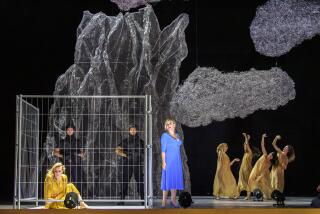Rage not, oh modern Medea
- Share via
If Euripides were alive today and were to rewrite his ancient tale “Medea” to a 21st century tune, perhaps he would take the tack of novelist Ludmila Ulitskaya in her second novel, “Medea and Her Children.” Startlingly familiar and strange all at once, Ulitskaya’s Medea is our postmodern heroine, living by the Crimean Sea, no longer the barbaric foreigner as she was depicted in Euripides’ play, but the last of a Greek family, childless, widowed and staunchly Greek Orthodox. Like the Greek play, this Medea is about infidelity and the very personal ways in which people respond to it.
In a lyrical and rich translation from the Russian by Arch Tait, “Medea and Her Children” is a loosely woven collection of vignettes about Medea and her relatives, told in flashback and current time, covering decades of both personal and political turmoil. The book’s story is impressionistic, neither simple nor straightforward, the form mirroring Ulitskaya’s philosophy that learning doesn’t come in neat linear narratives but in fits and starts, where the most potent lesson in life can have impact three-quarters of the way through, as the shocker does in “Medea.”
Medea is not in exile, as was her Euripidean namesake, but living an isolated life in the rural village of her ancestors. Only during the summer is she overwhelmed for months at a time by her nieces, nephews, great-nieces and great-nephews, cousins, second cousins and cousins once and twice removed. Medea’s womb may be barren, but her home is not. It is during this summer visitation that she catches up on the restless lives of her relatives, and through them, must repeatedly revisit the one sufferance in her own life, that of the consequences of her now deceased husband’s infidelity.
Whereas Euripides’ Medea ranted and raved and committed the ultimate heinous crime of killing her children, her husband’s new wife and his royal father-in-law, Ulitskaya’s Medea takes a contemplative and self-loving approach. She is mature, steadfast and rational, neither as vengeful nor as clever as the original Medea.
Medea’s relatives all struggle with the machinations of matrimony and perfidy. She observes them and uses their experiences to counsel herself. When Medea learns that her husband Samuel’s indiscretion was with her own baby sister and produced her favorite niece, Nike, she is deeply stunned. She travels across the country, as if in a trance, to visit Elena, her best friend and sister-in-law. Once there, it is apparent that Elena and Medea’s brother, Fyodor, have had their own fair share of problems. The couple have adopted an orphan, Shurik, who bears a striking resemblance to Fyodor and Medea’s Greek side of the family. Fyodor makes a boastful confession to Medea that he is Shurik’s biological father and that the mother, before her death, was his lover. In another offhand remark, he confirms that everyone in the family knew about Samuel and Alexandra’s affair, and Nike’s parentage. Elena never discusses the traumatic situation with Medea, but it is obvious that she is raising Shurik, without prejudice, as one of her own.
Much has changed since the ancient Greeks, but not so much that Ulitskaya isn’t concerned with the same potentially devastating effects of infidelity. Medea decidedly takes instruction from Elena’s grace and compassion in the face of difficulty and finds inner peace as a result.
“Medea and Her Children” is everything one would expect from a “modern Russian novel,” grand without being cliched, emotional without being sentimental. It encompasses decades, is quick-paced and full of colorfully dissatisfied characters jumping in and out of bed with each other. There are the requisite tragedies, including a suicide, all of which are told against a background of Russian political upheaval. Ulitskaya’s writing in “Medea” is a marked difference from her stylistically terse first novel, “The Funeral Party,” about a group of Russian immigrants in 20th century New York City.
At the end of the novel, we see that Medea is the person we all hope to become, the one who has gained the wisdom and ability to offer counsel but knows that it is up to each of us to discover these insights in our own individual way. Writes Ulitskaya, “Medea, silently taking a few sips from the heavy liqueur glass, would explain to [her niece, Aldona] that suffering and calamities are given to us so that the question ‘Why us?’ should be replaced by the question ‘What is this for?’ ... Perhaps too Medea would have told her in quiet and simple words about various events in life which occur not because of unfairness but just because of the nature of life.”
More to Read
Sign up for our Book Club newsletter
Get the latest news, events and more from the Los Angeles Times Book Club, and help us get L.A. reading and talking.
You may occasionally receive promotional content from the Los Angeles Times.




